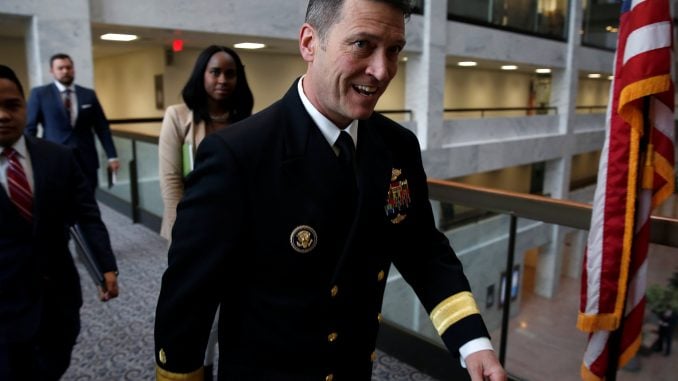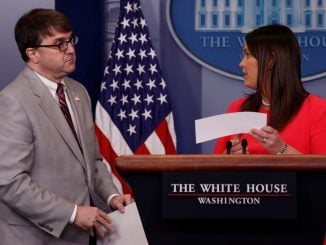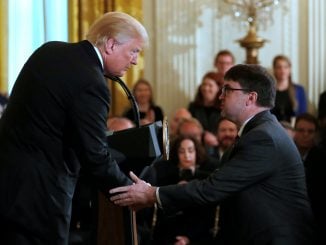
WASHINGTON, D.C.- U.S. President Donald Trump’s physician Ronny Jackson withdrew on Thursday from the nomination to head the Department of Veterans Affairs. Jackson said that allegations about misconduct were “completely false and fabricated” and had become a distraction to the Trump administration. His decision followed news that a Senate panel postponed his confirmation hearing.
“While I will forever be grateful for the trust and confidence President Trump has placed in me by giving me this opportunity, I am regretfully withdrawing my nomination to be Secretary for the Department of Veterans Affairs,” Jackson said in a statement.
On Wednesday, Democratic Committee staff gave the Senate Committee on Veterans’ Affairs a report on allegations that Jackson, who has been physician to three presidents, had overseen a hostile work environment as White House physician, drank on the job and allowed the overprescribing of drugs.
The allegations, which were anonymously sourced, claim Jackson prescribed himself medications, drank alcohol excessively during overseas trips, and wrecked a government vehicle, a summary of the document said.
Jackson has denied the claims.
“The allegations against me are completely false and fabricated … Unfortunately, because of how Washington works, these false allegations have become a distraction for this President and the important issue we must be addressing – how we give the best care to our nation’s heroes,” Jackson said.
Jackson, 50, has worked as a presidential physician since the George W. Bush administration, and has been the lead doctor for Trump as well as former President Barack Obama. He is well-liked by both Republican and Democratic administration officials.
The White House on Wednesday defended itself from charges that it failed to adequately vet Jackson.
“In fact, because Dr. Jackson has worked within arm’s reach of three presidents, he has received more vetting than most nominees,” White House spokeswoman Sarah Sanders told reporters.
The U.S. Navy rear admiral and Iraq war veteran took on a higher profile when he gave a long and glowing news conference about Trump’s health in January after his first presidential medical exam.
Trump nominated Jackson in late March to lead the sprawling Veterans Affairs department were questioned from the time. The agency has 350,000 employees and runs 1,700 facilities that serve more than 9 million veterans a year.
The department has long been under fire for the quality of healthcare it provides veterans, a group that carries considerable political clout in America. During his election campaign, Trump vowed to clean it up.
The Senate committee considering his nomination asked the White House this week for more information after initial allegations were levied against Jackson.
The White House provided copies of Jackson’s performance reviews with handwritten notes of effusive praise from former President Barack Obama and Trump, and said the FBI had given him a clean background investigation.
Trump on Tuesday said during a news conference that he did not know the details of the allegations, but said it was up to Jackson whether to continue with a political process he called “too ugly and too disgusting.”
Jackson met with Trump late in the day, and afterward a White House official said the doctor would “certainly not be railroaded by a bitter ex-colleague.”

Still, Jackson announced Wednesday to withdraw from the process, and Trump said during an on-air phone interview with Fox News, that the Democrats in Congress were obstructionists. He accused them of politicizing his nominees. He singled out Democratic U.S. Senator Jon Tester, who gave a series of interviews criticizing Jackson.
“He would have done a great job,” Trump said of Jackson. “These are all false accusations. They’re trying to destroy a man.”
Trump said he has a new candidate with “political capabilities” for the job.


